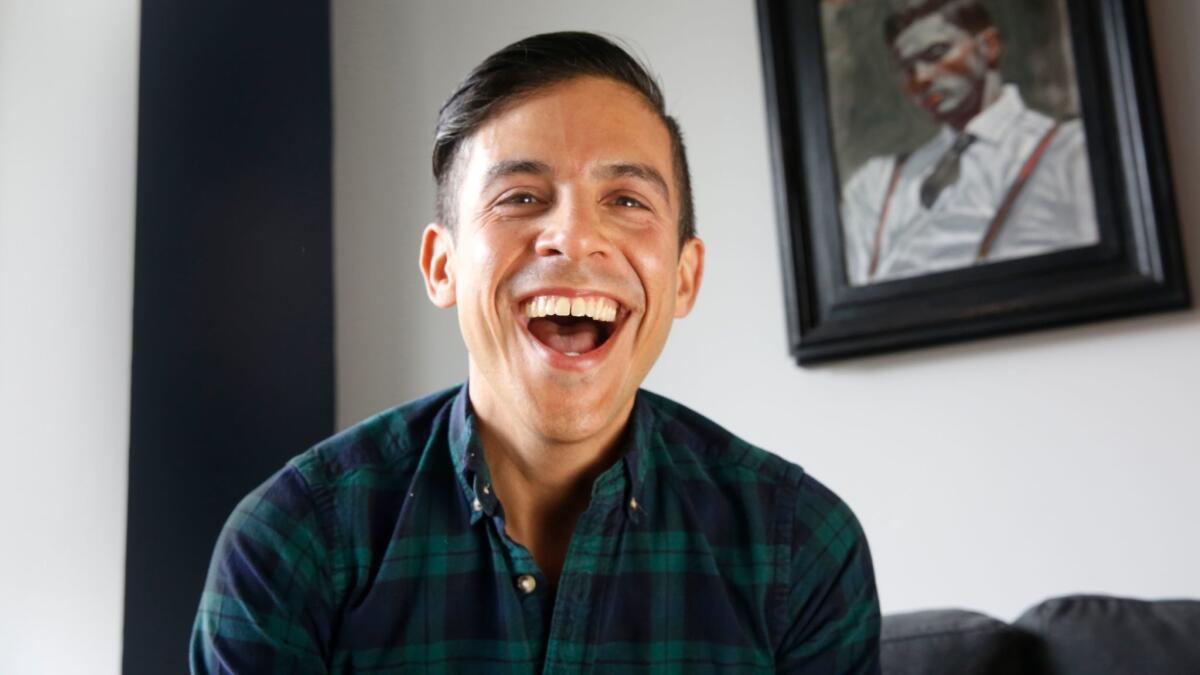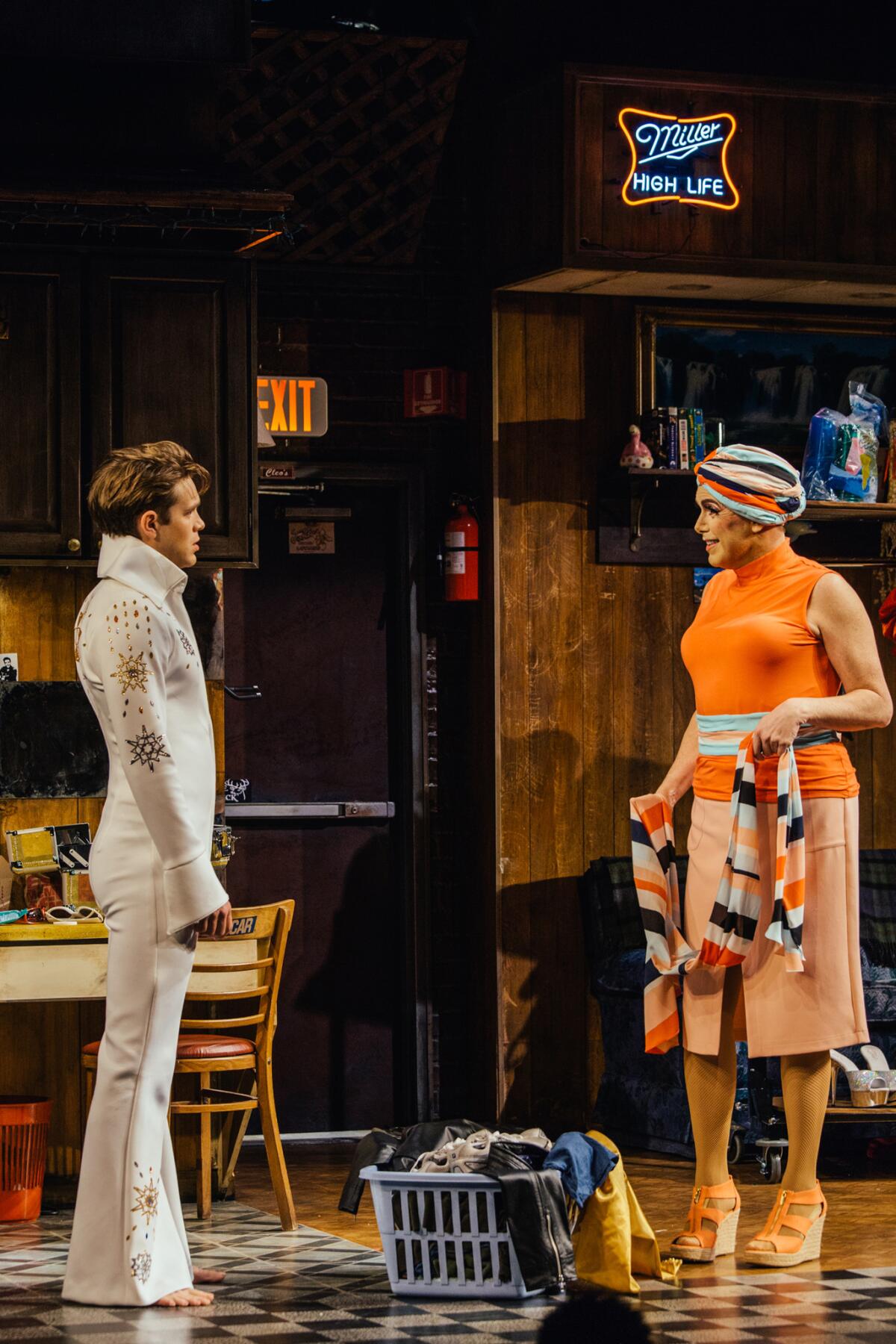Q&A: How an Elvis impersonator-turned-drag queen was born: Playwright Matthew Lopez on ‘Georgia McBride’

- Share via
Writer Matthew Lopez, whose play “The Legend of Georgia McBride” is at the Geffen Playhouse through May 14, has drama in his blood. After he saw his aunt, Priscilla Lopez, in her Tony-winning performance in Broadway's "A Day in Hollywood / A Night in the Ukraine" as a boy in 1980, he decided to become an actor.
It came as a surprise to those who knew him when, in his mid-20s, having moved from Florida to New York to pursue his dreams, Lopez abruptly quit acting and started writing in the early 2000s. But he soon emerged as one of the most-produced playwrights in the country.
At first glance, his plays form a remarkably diverse oeuvre: “The Whipping Man,” his Civil War drama; “Somewhere,” the story of a Puerto Rican family lost in Broadway dreams; “Reverberation,” about a lonely gay man learning to connect in New York City; and "Georgia McBride," a drag-queen-coming-of-age extravaganza. But Lopez points out that the works share a theme: “They’re all about home, creating home and family — either blood family or manufactured family. 'Georgia McBride’ is about a group of people who don’t really fit in anywhere else. I call them my misfit toys, and they build a home together at the bar.”
The bar is a coastal Florida dive where a struggling Elvis impersonator named Casey (Andrew Burnap) does his act. Just as Casey learns that his wife (Nija Okoro) is expecting their first child, he loses his stage to a pair of drag queens, Tracy Mills (Matt McGrath) and Anorexia Nervosa, a.k.a. Rexy (Larry Powell). When Rexy goes AWOL, Tracy takes Casey under her wing, and in a flurry of sensational costumes, country music and lip-sync malfunctions, the legend of Georgia McBride is born.
Lopez, who lives in New York, spoke by phone for this edited conversation about his "Georgia" journey.
“Georgia McBride” is set in your hometown of Panama City, Fla. Did you know a lot of drag queens growing up?
Not growing up. But when I was in my late teens, I had a friend who started doing drag, and I would go to the one and only gay bar in town and watch him perform. I would also hang out in the dressing room before the show and watch the queens get dressed. So my introduction to drag was largely from the inside out. I had a firsthand demonstration of how it came together, how it was built on these queens’ bodies and on their faces, and how it became something wonderful and electric onstage.
I don’t think that I would have an appreciation of drag — other than just being a gay man who has spent a lot of time in gay bars — if I hadn’t first seen the work that goes into it and the artistry of it. There’s a line in the play where Casey says, “I don’t know anything about doing drag.” And Tracy says, “Like that’s ever stopped anyone from doing drag.” I think that’s true to a large extent, but for those who really do know how to do it, who are experts in it, it’s a fascinating transformation to watch. I wanted to see that happen onstage — of course, an abbreviated, madcap version of it, because to fully get into drag can take hours.
How many productions of “Georgia” have you worked on so far?
I’ve only ever worked on this production with Mike Donohue, and we’ve done it three times now: Denver, New York and now Los Angeles. For me it has always been Mike directing, Matt McGrath playing Tracy, Donyale Werle and Jill BC Du Boff on set and sound, respectively, and since New York it’s been Paul McGill choreographing. We've formed a very tight band of collaborators.
There have been other productions. I’ve heard that they’ve been really lovely. I’ve not seen any yet. I suspect that I would be no use to another production. I’d just be like, “Well, let me tell you what Mike did.” But it’s a great gift to know that other artists across the country get to explode their own imaginations and put their own stamp on the play.
What inspired you to make your fish-out-of-water, Casey, a straight man venturing into drag?
It actually all started with a playlist, which my then-boyfriend, now-husband, and I got our hands on from friends of a friend. The legend of this playlist has it that — and I’ve never met the people in question — the roommate of a friend had created this playlist for her boyfriend, who was beginning to explore drag as a performance outlet.
The playlist was called “Persona,” and it was filled with country-western female vocalists: Dolly Parton and Loretta Lynn and Brenda Lee and other fun stuff. Interspersed with those were covers of Elvis Presley songs and songs about Elvis by female vocalists.
Drag, as it’s practiced in these small, Southern gay bars, enables a sense of transgression, a sense of rebellion, a sense of resistance.
— Playwright Matthew Lopez
My husband and I listened to it a lot, and I began to see the play. I was attracted to the notion of a straight man exploring drag. The guy the playlist was written for lived in Brooklyn, so he was not necessarily a surprising candidate for a straight man to do drag — as I’ve joked before, half the straight men in Brooklyn have done drag once in their lives. For my own story I needed to find someone more unlikely. And that’s where I got the idea of setting it in my hometown and telling the story of this down-on-his-luck straight white guy who is an aspiring Elvis impersonator, who has definitely got performing in his blood, but who has not yet fully actualized as an artist or a person. And he stumbles on this and blossoms as a result, and really comes into his own as an adult through this process.

Casey’s drag mentor, Tracy Mills, is so funny. Do all of her jokes come from your imagination?
It’s a little hard to tell at this point. For royalty purposes, I’ll claim all the good lines. But if I’m being honest, I don’t know where my character ends and Matt McGrath’s performance begins. I can’t decouple them anymore in my mind. Matt is Tracy and Tracy is Matt. What Matt enabled me to do was write for a very specific voice, an actor with a tremendous range and a tremendous comedic — the word is overused but I think it’s accurate here — genius. It’s fun to write for a genius.
I watch him on that stage, and I have to remind myself that Tracy is my invention. She does come from my imagination, but without Matt interpreting her, I would not have been able to write those things. You’d need an anthropologist to go in and sort of sift through it. I don’t know anymore. I’m happy not knowing.
Rexy gives a speech about what it really means to be a drag queen. Were you conscious of how you were contributing to the discourse, which is such a theme in musical theater, about the sociopolitical significance of drag?
That was less an imperative at the beginning of the work. I was more interested in simply telling the story. But the story has required me to explore what drag means to me. Rexy's speech is my attempt to state for myself, if for no one else, how I view drag. For Casey it is one thing and for Rexy it is quite another. She has to remind him — or teach him for the first time — that drag once was and still is a dangerous thing, and by the same token, it is the only way for some people to survive in a dangerous world.
I remember when I was a teenager, growing up gay in a very conservative town, that being inside this gay bar did feel safe. Drag, as it’s practiced in these small Southern gay bars, enables a sense of transgression, a sense of rebellion, a sense of resistance. And it’s also a hell of a lot of fun.
SIGN UP for the free Essential Arts & Culture newsletter »
I love the tender, mutually supportive relationship Casey shares with his wife, Jo.
That’s my marriage up on stage, without a doubt. I am definitely Casey in that scenario, and Jo is definitely my husband.
How long have you been married?
A little under two years, but we’ve been together 12 years.
Is your husband in the arts too?
No, thank God! He’s a normal person. A real person. He works in education.
But he tolerates your artiness, the way Jo tolerates Casey’s?
Oh, I think at the end of the day he’s probably charmed by me more than he admits.
♦ ♦ ♦ ♦ ♦ ♦ ♦ ♦ ♦ ♦
‘The Legend of Georgia McBride’
Where: Geffen Playhouse, 10886 Le Conte Ave., L.A.
When: 8 p.m. Tuesdays-Fridays, 3 and 8 p.m. Saturdays, 2 and 7 p.m. Sundays; ends May 14
Tickets: $32-$90 (subject to change)
Information: (310) 208-5454, www.geffenplayhouse.org
Running time: 1 hour, 40 minutes
Support coverage of SoCal arts. Share this article.
YOU MIGHT ALSO LIKE ...
The review: 'Georgia McBride' at the Geffen Playhouse
This teacher waited in line nearly 24 hours to get 'Hamilton' tickets for her students
Laurie Metcalf in 'Doll's House, Part 2': An acting marvel in one of the year's best plays
The biggest entertainment stories
Get our big stories about Hollywood, film, television, music, arts, culture and more right in your inbox as soon as they publish.
You may occasionally receive promotional content from the Los Angeles Times.







